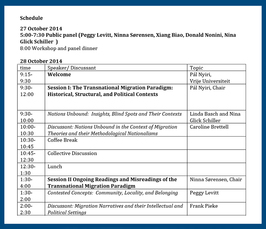"Perspectives on Nation Unbound: The Transnational Migration Paradigm in the Current Conjuncture"
Workshops, conferences 2014
- Beginn: 27.10.2014 17:00
- Ende: 29.10.2014 16:00
- Ort: Vrije Universiteit Amsterdam

For more details please contact esser(at)mmg.mpg.de.
In 1994, in their book Nations Unbound, three
anthropologists, Linda Basch, Nina Glick Schiller, and Cristina Szanton Blanc,
argued for a transnational paradigm for the study of migration. Nations
Unbound challenged a generation of researchers in multiple disciplines to
rethink their approaches to immigration, ethnicity, nationalism, gender, class
and status, racialization, religion, globalization, family studies, health, and
social welfare. The transnational paradigm spoke to the global situation in
which increasing numbers of people in countries facing economic restructuring
and political crisis were migrating and establishing themselves in other
countries but simultaneously building and maintaining home ties.
Nations Unbound marked the beginning of a new approach to migration in anthropology, as well as inspiring a corpus of work going beyond anthropology and sometimes called “transnational studies.” Much of this work has focused on the multiple anchoring of migrants, sometimes taking it to applied directions in order to help formulate policies including those on migration and development. What has rarely been done, however, is querying the original paradigm and the research and policy it generated as a product of a specific historical conjuncture. In the past decade, social theorists have called for greater reflection on how analytical frameworks reflect and contribute to the intellectual, cultural, and political-economic context from which they develop. These questions became central to the debates about whether concepts of globalization or cosmopolitanism described reorganizations of global conditions or new paradigms for studying those conditions. However, this reflexive stance has rarely been fully developed within transnational migration studies. Scholars have not sufficiently attended to the altered possibilities of individuals living their lives across borders in relationship to continuing economic and political restructuring of global capitalism in crisis which has produced a migration industry and privatization of state functions, changing conditions of labor and labor regulation, the diminution of the right to settle and citizenship rights, securitization and border regimes and the disparities of the migration and development schemes.
Participants:
- Nina Glick Schiller, University of Manchester (emerita), Max Planck Institute for the Study of Ethnic and Religious Diversity
- Linda Basch, National Council for Research on Women, U.S. (President Emerita)
- Caroline Brettell, Southern Methodist University
- Ayşe Çaglar, University of Vienna
- Nicholas De Genova, King’s College London
- Bela Feldman Bianco, Campinas State University, Brazil
- Peggy Levitt, Wellesley College
- Donald Nonini, University of North Carolina
- Frank N. Pieke, Leiden University
- Ninna Nyberg Sørensen, Danish Institute for International Studies
- Xiang Biao, University of Oxford
- Brenda Yeoh, National University of Singapore